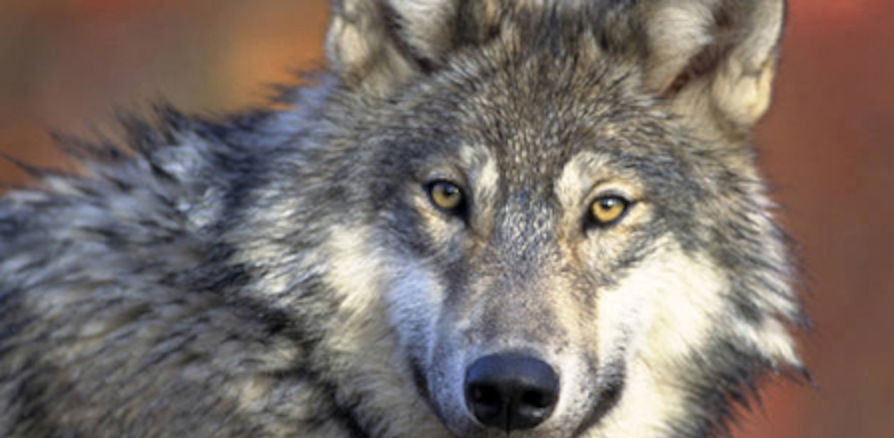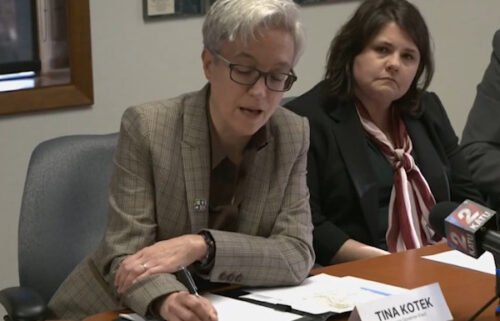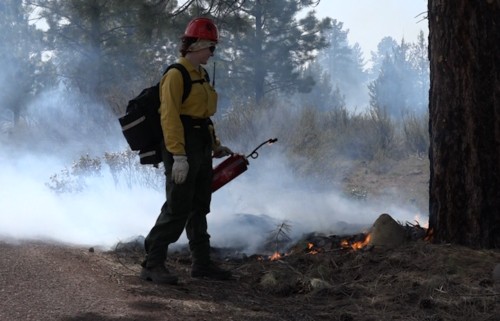Judge restores protections for gray wolves across much of US

BILLINGS, Mont (AP) — A judge restored federal protections for gray wolves across much of the U.S. on Thursday after they were removed in the waning days of the Trump administration.
U.S. District Judge Jeffrey White in Oakland, California, said the U.S. Fish and Wildlife Service had failed to show wolf populations could be sustained in the Midwest and portions of the West without protection under the Endangered Species Act.
Wildlife advocates had sued the agency last year, saying state-sponsored hunting threatened to reverse the gray wolf’s recovery over the past several decades. The ruling does not directly impact wolves in the northern Rocky Mountains of Idaho, Montana, Wyoming, and portions of several adjacent states that remain under state jurisdiction after protections in the region were lifted by Congress last decade.
Federal officials had defended the Trump rule that removed protections, arguing wolves are resilient enough to bounce back even if their numbers dropped sharply due to intensive hunting.
At stake is the future of a species whose recovery from near-extinction has been heralded as a historic conservation success. That recovery has brought bitter blowback from hunters and farmers angered over wolf attacks on big game herds and livestock. They contend protections are no longer warranted.
Interior Department spokesperson Melissa Schwartz said the agency was reviewing Thursday’s decision and offered no further comment.
Wildlife advocacy groups said the judge’s order would most immediately put a stop to hunting in the Great Lakes region, where Wisconsin officials had come under criticism after a wolf hunt last year blew past the state’s quotas, killing 218 wolves in four days.
“Wolves in the Great Lakes region have a stay of execution,” said John Horning with the environmental group WildEarth Guardians.
None of the Great Lakes states with established wolf populations -- Michigan, Minnesota and Wisconsin -- had scheduled additional wolf hunts prior to the judge’s ruling. Natural resources officials with all three declined immediate comment Thursday, saying they were reviewing the decision.
A state judge in Wisconsin in October had blocked another hunt two weeks before it was to begin, responding to lawsuits contending it had been illegally scheduled.
The U.S. Fish and Wildlife Service since September has been separately reviewing if protections should be restored for the predators in the northern Rockies, after Republican state lawmakers in Montana and Idaho passed laws last year intended to drive down wolf numbers by making it easier to kill them. Those protections were not challenged in the lawsuit decided Thursday.
Under the loosened rules, hunters and trappers primarily in Montana have killed a record 23 wolves that wandered outside Yellowstone National Park this winter, drawing public outrage due to the popularity of the park’s wolf packs among tourists who visit from around the world.
In response to the killings, Interior Sec. Deb Haaland published an op-ed this week saying federal officials could give wolves emergency protection if the well-being of wolves is put at risk.
“Recent laws passed in some Western states undermine state wildlife managers by promoting precipitous reductions in wolf populations, such as removing bag limits, baiting, snaring, night hunting and pursuit by dogs — the same kind of practices that nearly wiped out wolves during the last century,” Haaland wrote.
Wolves once ranged most of the U.S. but were wiped out in most places by the 1930s under government-sponsored poisoning and trapping campaigns.
A remnant population in the western Great Lakes region has since expanded to some 4,400 wolves in Michigan, Minnesota and Wisconsin. And more than 2,000 wolves occupy six states in the Northern Rockies and Pacific Northwest.
Yet wolves remain absent across most of their historical range. Wildlife advocates argue that continued protections are needed so they can continue to expand in California, Colorado, Oregon and other states.
Democratic and Republican administrations alike, going back to former President George W. Bush, have sought to remove or scale back federal wolf protections first enacted in 1974.
___
Flesher reported from Raleigh, North Carolina. Follow Matthew Brown on Twitter: @MatthewBrownAP
News release from the Western Environmental Law Center
Judge restores gray wolf protections, reviving federal recovery efforts
Wolves in Northern Rockies still face brutal slaughter
OAKLAND, CA—Today, a federal court restored Endangered Species Act protections for the gray wolf after they were eliminated by the Trump administration in 2020. The ruling orders the U.S. Fish and Wildlife Service to resume recovery efforts for the imperiled species. Today’s decision redesignates the gray wolf as a species threatened with extinction in the lower 48 states with the exception of the Northern Rockies population (map), for which wolf protections were removed by Congress in 2011.
The most recent data from the U.S. Fish and Wildlife Service and its state partners show only an estimated 132 wolves in Washington state, 173 in Oregon (with only 19 outside of northeastern Oregon), and fewer than about 20 in California. Nevada, Utah, and Colorado have had a few wolf sightings over the past three years, but wolves remain functionally absent from their historical habitat in these states. In 2020, Colorado voters directed the state to reintroduce wolves by 2023.
“The science is clear that gray wolves have not yet recovered in the western U.S. By design, the Endangered Species Act does not provide the federal government the discretion to forsake western wolf recovery in some regions due to progress in other parts of the country,” said Kelly Nokes, Western Environmental Law Center attorney. “Today’s decision will bolster recovery of western wolves – a keystone species wherever they exist – and improve ecosystem health more broadly.”
From the decision: "...the Service did not adequately consider threats to wolves outside of these core populations. Instead, the Service avoids analyzing these wolves by concluding, with little explanation or analysis, that wolves outside of the core populations are not necessary to the recovery of the species... In so concluding, the Service avoided assessing the impact of delisting on these wolves." Opinion at 11.
In delisting wolves, the Service ignored the science showing they are not recovered in the West. The Service concluded that because in its belief there are sufficient wolves in the Great Lakes states, it did not matter that wolves in the western U.S. are not yet recovered. The Endangered Species Act demands more, including restoring the species in the ample suitable habitats afforded by the wild public lands throughout the western U.S. Wolves are listed as endangered under state laws in Washington and California, and only occupy a small portion of available, suitable habitat in Oregon.
"This ruling is a huge win for wolves in states like California, Oregon, and Utah where they have yet to achieve stable, robust populations,” said Erik Molvar, a wildlife biologist and executive director with Western Watersheds Project. “We are relieved to have staved off premature delisting with this case, but there is still a huge amount of work ahead to protect wolves in Montana, Idaho, and Wyoming where they face some of their biggest threats."
“The nation has witnessed the brutality that happens when 'management' of wolves is returned to anti-wolf states like Montana and Idaho, which have implemented an aggressive eradication agenda, including surrounding Yellowstone National Park,” said Lindsay Larris, Wildlife Program director at WildEarth Guardians. “Restoring federal Endangered Species Act protections for wolves is essential to their recovery throughout their historic range, so while we are thankful for this ruling we also call on Secretary Deb Haaland to issue emergency relisting protections for the Northern Rockies wolf population to halt the senseless slaughter taking place.”
The conservation groups have long been active on wolf recovery issues in the western U.S., including working with western states to develop science-based wolf management plans, mounting cases to rein in rogue federal government wolf-killing programs, promoting recovery efforts in the Southwest for critically imperiled Mexican gray wolves, and working with local governments and landowners to deploy non-lethal tools that prevent wolf-livestock conflicts.
“Over the past two winters, we lost icons of wolf recovery when OR-7 and his mate OR-94 passed away in southern Oregon’s Cascades. These two wolves represent the first generation of wolves in western Oregon in nearly a century,” said Michael Dotson with the conservation group Klamath Siskiyou Wildlands Center based in southwest Oregon. “Delisting is premature and obviously politically driven.”
“Wolves are an integral part in the health and resilience of western ecosystems,” said Adam Gebauer, Public Lands Program director at The Lands Council. “Local land managers, state wildlife offices and the federal government must work together and rely on science and not politics to ensure their recovery. Wolves are our allies in the conservation of wildlands.”
“Today’s victory injects hope and resources into ongoing efforts to restore wolves across their historic range,” said Bethany Cotton, conservation director for Cascadia Wildlands. “We look forward to engaging with the U.S. Fish and Wildlife Service to ensure wolf management is guided by sound science, not prejudice.”
“The politically driven delisting of wolves in the Northern Rockies by Congress incorrectly included all of eastern Washington, east of US Highway 97. It was an arbitrary decision then and it still is today,” said Timothy Coleman, director of Kettle Range Conservation Group and former member of the Washington state Wolf Advisory Group. “Eighty-five percent of wolves killed in Washington were from the Kettle River Range, where unfortunately the gray wolf is still at risk despite the court’s excellent decision. And though Washington has kept state endangered species protections for wolves, that clearly provides little protection. Had wolves retained federal Endangered Species Act protection, entire wolf families would not have been slaughtered and could have dispersed into unoccupied areas of the state with excellent habitat such as southwest Washington, Mount Rainier and Olympic National Park.”
“California’s wolves are just starting to return home,” said Tom Wheeler, executive director at the Environmental Protection Information Center. “Today’s decision means these animals will have the help of federal wildlife managers to establish a true foothold in their historic habitat in the state.”
“We must learn to coexist with gray wolves. These highly intelligent and social animals play a key role in balancing entire ecosystems,” said Kimberly Baker of the Klamath Forest Alliance. “Federal protection is paramount to safeguarding this nation’s rightful heritage.”
Unfortunately, today’s decision will do nothing to stop the ongoing slaughter of wolves in Montana, Idaho, and Wyoming—including surrounding Yellowstone National Park and Glacier National Park. These states removed wolves’ endangered species protections via federal legislation. The current war on wolves in the northern Rockies shows the stark reality of what happens when “management” is turned over to states hostile to wolves.
In just the past few months, at least 23 Yellowstone wolves—more than 20% of the park’s entire wolf population—have been killed outside the park, causing widespread outrage and condemnation from Yellowstone National Park’s supervisor, wolf researchers, and wildlife professionals. Hunters in Montana and Idaho can lure wolves out of Yellowstone with bait, strangle them with snares, and shoot them at night on private land.
Both states have established wolf bounties and in Idaho it's legal to run down a wolf with ATVs and snowmobiles. While celebrating today’s positive ruling for wolves, the groups also call on the Biden administration to immediately issue emergency relisting protections for the Northern Rockies population of the gray wolf under the Endangered Species Act.
The coalition of western wildlife advocates involved in this legal challenge includes WildEarth Guardians, Western Watersheds Project, Cascadia Wildlands, Klamath-Siskiyou Wildlands Center, Environmental Protection Information Center (EPIC), The Lands Council, Wildlands Network, Klamath Forest Alliance, and Kettle Range Conservation Group, represented by the Western Environmental Law Center.



